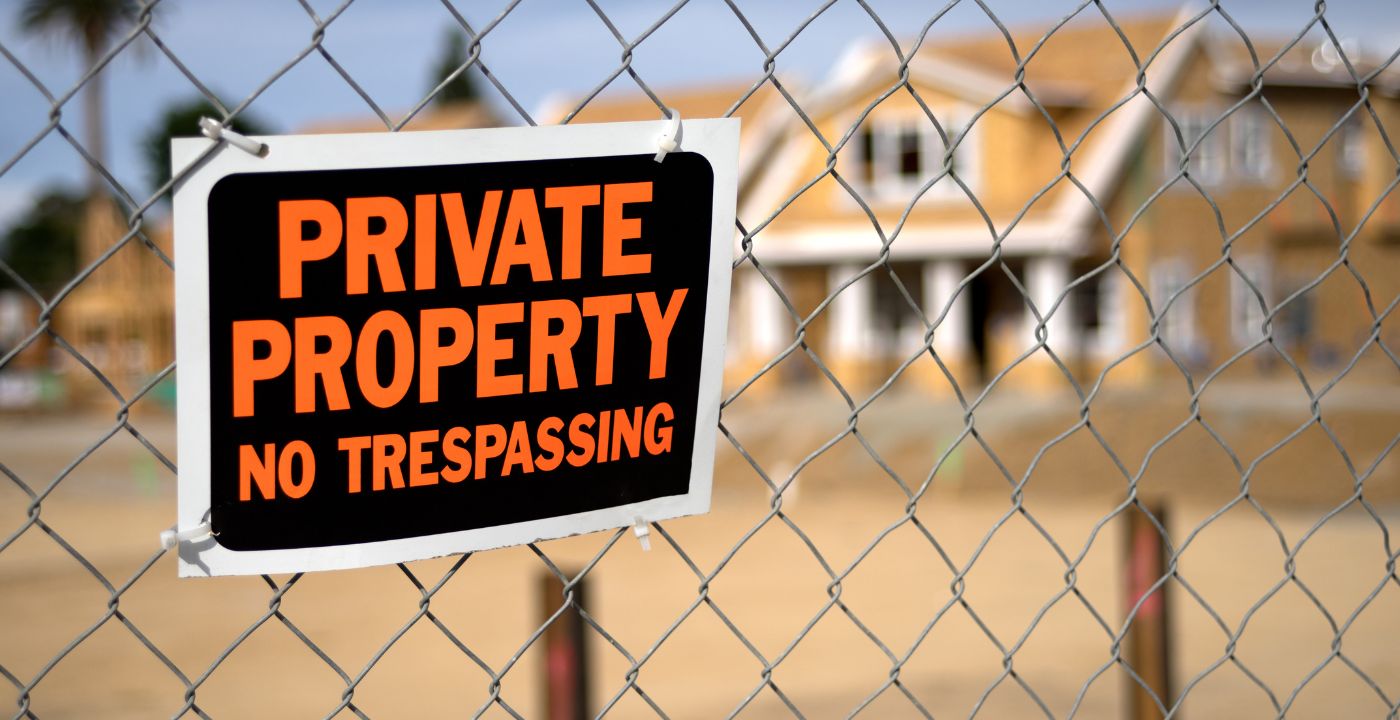Dealing with squatters in Massachusetts requires understanding the legal landscape. Squatters live on property without owner permission, creating stress for owners due to the complexity of removing them. Here’s our guide to squatters’ rights in Massachusetts.
Key Summary
- Squatting differs from trespassing as it can lead to legal ownership claims under certain conditions, unlike simple unauthorized entry.
- The legislature in Massachusetts allows squatters to claim legal ownership of a property via adverse possession after 20 years of occupancy without the owner’s permission.
- Property owners can remove squatters by following a legal process that can include eviction notices and obtaining a court order.
- Take preventative measures such as regular property inspections and securing vacant properties to deter squatters.
What Rights Do Squatters Have?
Across the US, squatters’ rights are deeply rooted in the principle of adverse possession. This offers a pathway for individuals occupying property without permission to claim legal ownership eventually.
Section 21 of General Law in Massachusetts dictates that property claims through adverse possession can only be initiated after 20 years of occupancy. This is regardless of “Color of Title”, which is when the individual believes they have a right to possess the property.
ℹ️ Tell Me More: Color of title is when a document seems to grant property ownership but is flawed. It suggests ownership without full legal rights
This legal provision creates an opportunity for squatters to establish ownership if they can demonstrably meet the strict criteria of adverse possession. The criteria for how to prove adverse possession in Massachusetts include:
- The occupation must be without the owner’s permission.
- The squatter acts like the property’s owner.
- The squatter’s presence is obvious to everyone.
- The squatter does not share the space with others.
- The squatter stays for 20 straight years.
For property owners keen to prevent squatters from taking over their property, it is important that they actively manage and monitor their property rights to prevent the possibility of squatters and adverse possession in Massachusetts.
How Do I Evict a Squatter in Massachusetts?
When it comes to how to remove squatters in Massachusetts, the process is similar to kicking out rental tenants, although there are a few differences.
This step-by-step legal process ensures that the removal of squatters is carried out in the right way and prevents them from returning.
1. Issuing Eviction Notices
14-Day Notice to Quit
Used for squatters in a rental property without a lease or where there is a lease violation.
30-Day Notice to Quit
Applicable for squatters who have stayed beyond their welcome without a formal lease agreement.
7-Day Notice to Quit
Often employed in situations where the squatter has caused damage or poses a threat, requiring swift action
Legal Proceedings
Following the issuance of the notice, property owners must file a Summons and Complaint with the local court. This initiates the formal eviction process.
2. Court Hearing and Judgment
Following the issuance of the notice, property owners must file a Summons and Complaint with the local court. This initiates the formal eviction process.
3. Court Hearing and Judgment
A hearing date is set, where both parties can present their case. If the judge rules in favor of the property owner, an eviction order is issued.
4. Writ of Execution
This legal document is the final step, issued by the court, which mandates the squatter’s removal. It grants the squatter 48 hours to vacate the property voluntarily.
5. Forcible Removal
If the squatter does not comply with the Writ of Execution within the specified timeframe, they can be forcibly removed by law enforcement.
How Can You Prevent Squatters in MA?

Taking preventative measures is crucial for property owners in Massachusetts to avoid the complications squatters can bring. Adopting a proactive stance towards property management allows owners to significantly reduce the risk of unauthorized occupancy.
1. Regular Property Inspections
Conducting frequent inspections allows owners to spot early signs of squatting or vandalism. These routine checks act as a deterrent to potential squatters, signaling that the property is actively managed and monitored. It’s about keeping an eye out so you can act before a small issue becomes a big problem.
2. Securing Unoccupied Properties
Ensuring that vacant properties are well-secured is a key defense against squatters. This means installing sturdy locks, possibly upgrading to security doors and windows, and considering the installation of alarm systems or surveillance cameras. Such measures not only deter squatters but also provide evidence of unauthorized entry should it occur.
3. Swiftly Address Unauthorized Occupancy
Immediate action upon discovering unauthorized occupants can prevent squatters from establishing rights. Quick responses include legal notices and, if necessary, involving law enforcement or legal counsel. The goal is to convey to the squatters that their presence is known and not tolerated, encouraging them to vacate voluntarily before formal eviction processes are initiated.
4. Establish Clear Boundaries
Clearly defined property boundaries, marked by fencing, walls, or signage, serve as a physical and psychological barrier to squatters. It signifies the private nature of the property and asserts the owner’s intent to protect their property rights. It is important to make it known that the property is cared for and watched over, reducing its attractiveness to squatters.
5. Maintaining Visible Signage
Signs that declare “No Trespassing,” “Private Property,” or “Surveillance in Use” can be effective in deterring squatters. These signs communicate to potential squatters that their presence is unwelcome and illegal, and that there are eyes on the property even when it seems unattended. It’s a simple but effective way to make your stance clear without having to be there physically.
What is the Difference Between Squatting and Trespassing?

Squatting and trespassing differ fundamentally in their legal interpretations and consequences. While trespassing is a criminal offense, squatting is considered a civil matter, with squatters potentially claiming rights to a property under specific conditions.
One of the main distinctions lies in the potential for squatters to assert ownership through adverse possession, a pathway not available to mere trespassers.
Trespassing is when someone goes onto or stays on property without permission, and it’s a criminal offense. This means the person can be arrested and taken to court right away. People who trespass usually don’t plan to stay long; they’re just there without the intention to make any claim on the property.
Squatting is more complicated. It’s when someone lives on or uses someone else’s property without permission and might try to claim legal rights to it over time through a process called adverse possession. Unlike trespassing, squatting is handled in civil courts, not criminal ones, because it’s about disputes over property rights, not breaking criminal law.
Implications for Property Owners
For property owners, understanding the distinction between these two is crucial for addressing unauthorized use of their property effectively. While trespassers can be swiftly dealt with by law enforcement, removing squatters may require a more nuanced approach, including legal proceedings to dispute any claim of adverse possession they might attempt to establish.
What is the Difference Between a Squatter and a Holdover Tenant?
Holdover tenants and squatters both live on property without the owner’s or landlord’s okay, but they come from different situations.
A holdover tenant used to have a lease that let them live there legally, but they didn’t leave when the lease ended. They legally got into the place at first.
They only become trespassers if the landlord tells them to go and they stay, however, it is important to note that in Massachusetts, according to Community Action Agency of Somerville, you don’t have to leave your apartment unless a judge orders you. Landlords must follow the correct steps, as specified by Massachusetts State law.
Squatters, on the other hand, move into a place without any permission at all, often picking places that are empty or not looked after. They start off not being allowed here, almost like trespassers, but they might get the right to stay if they meet certain rules.
How do I evict a holdover tenant in Massachusetts?
Removing a holdover tenant, unlike dealing with squatters, doesn’t initially require the formal eviction notice typically seen in standard tenant-landlord relationships. This is mainly because their original lease has expired, removing the formal protection it provided.
The legal process to legally remove them does, however, mirror the eviction process known as a summary process. While landlords may not need to provide a notice to quit due to the lease’s expiration, offering a shorter notice, like a 72-hour warning, is often advised for clarity and to uphold a fair process.
The situation slightly changes if the holdover tenant continues to pay rent and the landlord accepts it. This action could potentially create a month-to-month tenancy under the law, granting the tenant more solidified rights and requiring the landlord to follow a formal eviction process, including the issuance of a proper notice to quit for eviction.
Frequently Asked Questions
Do Squatters Have to Pay Tax in Massachusetts?
There are some States that require squatters to pay property tax and they would need to actively be doing so if they are looking to claim adverse possession. This is not the case however in Massachusetts.
If a squatter successfully claims property through adverse possession, they will then become responsible for property taxes going forward. Adverse possession requires continuous, open, and notorious use for 20 years, among other criteria. Once ownership is legally transferred, the new owner (formerly the squatter) must pay all associated taxes.
How Do You Stop Adverse Possession in Massachusetts?
It is possible to stop adverse possession in several ways. The most straightforward method is to ensure that no squatter can meet the criteria for adverse possession. This includes preventing any squatter from continuously occupying the property for 20 years.
Regularly inspecting the property, promptly addressing any unauthorized use, and taking legal action when necessary can prevent squatters from acquiring rights. Additionally, formally leasing your property or allowing someone to use it with permission can interrupt the continuity needed for a claim.
Another option you can consider to prevent adverse possession is to grant permission to the squatters to use the property. This is only advisable when the squatter’s use of the property isn’t of concern and there is no likely harm.
If granting permission is not possible, or you simply don’t want to, then you will need to seek a legal injunction from the court.
Can I Sell a Property with Squatters?
It is possible to sell a home with squatters in, but it is likely to be to cash home buyers such as investors or home-buying companies.
These companies specialize in acquiring properties with complex issues, including squatter occupancy, and they know the process of removing them. As a result, you will often have to accept an offer below the market value but it does relieve you of the burden of evicting squatters.
Squatter Solutions
Handling squatters in Massachusetts requires property owners to stay alert and act quickly if unauthorized occupants are found. Understanding the basics, such as the difference between squatters and holdover tenants, is crucial.
Prompt action, including legal steps for removal or preventive measures, can help avoid complications. Ensuring your property is secure and clearly marking it as private can deter squatters, helping owners protect their property effectively.
Live stress-free and sell your home with squatters to us for cash. Contact us today.





